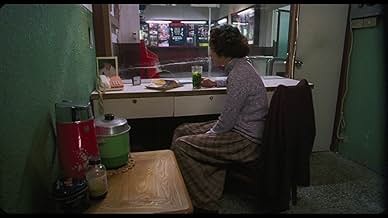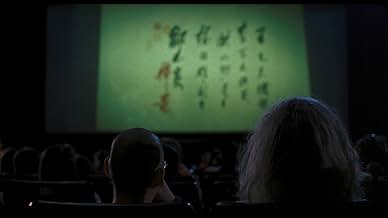IMDb RATING
7.1/10
6.5K
YOUR RATING
On a dark, wet night a historic and regal Chinese cinema sees its final film. Together with a small handful of souls they bid "Goodbye, Dragon Inn".On a dark, wet night a historic and regal Chinese cinema sees its final film. Together with a small handful of souls they bid "Goodbye, Dragon Inn".On a dark, wet night a historic and regal Chinese cinema sees its final film. Together with a small handful of souls they bid "Goodbye, Dragon Inn".
- Awards
- 13 wins & 11 nominations
- Director
- Writers
- All cast & crew
- Production, box office & more at IMDbPro
Storyline
Did you know
- TriviaThe theater used for the film was actually on the brink of being closed, and shortly before the film was released it was indeed closed, in an strange example of life imitating art.
- ConnectionsFeatures Dragon Inn (1967)
- SoundtracksChong Feng
by Ge Lan
Featured review
If you've read the other reviews, you know what you're in for. Don't worry about spoilers (none here, but don't worry about others'), because not much happens in the movie. Tsai paints his movies at the speed of Michelangelo painting a ceiling--no, he unreels them at the speed of the epic that's played this old movie house a thousand times. As in other Tsai movies, the colors are rich, and even the starkest images are carefully composed, allowing the film to convey the full depth of feelings.
That's what this movie does. It doesn't tell a story, really, but conveys what it's like to walk along empty city streets on a rainy night, alone. And what it's like to be in a dying old movie palace. The community that has outgrown the old Fu Ho cinema seems to tell its patrons, its employees, and even the building itself that all of them really ought to be somewhere else. But there they are, where they need to be, for the last show.
The movie's point of view is variously that of the young limping woman, the Japanese kid, and the old actors, but ultimately, Tsai tells the story from the theater's point of view, as if he interviewed it Tsai-style, pointing the camera at it and letting the theater speak at its edificial pace. You feel all that it's seen and sees, every day. It's as if the theater knows it's done for, resigned to its fate, not yet ready to die, too tired to fight.
It doesn't matter that the theater is in Taipei. Anyone who had a special place for movies, especially if it's gone, will be able to see that theater in the Fu Ho. I thought of my last visits to Seattle's Coliseum, King and United Artists theaters, and how they clung to life in their final days. All of them could seat hundreds of patrons, maybe a thousand even, and I never once saw them close to filled. The King is now a megachurch, the Coliseum is a Banana Republic, and the UA is dust, with the marquee sign marking its grave. The movies that played there live on in DVDs and shoebox megaplexes, but their days of playing in grand auditoria to great audiences are largely gone. How can "Lawrence of Arabia" be "Lawrence" in a shoebox, or on any CRT or LCD screen?
Norma Desmond told us about the pictures getting smaller. Tsai warns us that the last days of the big screen are here, and that the credits are rolling. Many loved the old moviehouses in their grand glory days, but in "Goodbye Dragon Inn," Tsai shows the beauty of the big theaters as their curtains slowly fall.
That's what this movie does. It doesn't tell a story, really, but conveys what it's like to walk along empty city streets on a rainy night, alone. And what it's like to be in a dying old movie palace. The community that has outgrown the old Fu Ho cinema seems to tell its patrons, its employees, and even the building itself that all of them really ought to be somewhere else. But there they are, where they need to be, for the last show.
The movie's point of view is variously that of the young limping woman, the Japanese kid, and the old actors, but ultimately, Tsai tells the story from the theater's point of view, as if he interviewed it Tsai-style, pointing the camera at it and letting the theater speak at its edificial pace. You feel all that it's seen and sees, every day. It's as if the theater knows it's done for, resigned to its fate, not yet ready to die, too tired to fight.
It doesn't matter that the theater is in Taipei. Anyone who had a special place for movies, especially if it's gone, will be able to see that theater in the Fu Ho. I thought of my last visits to Seattle's Coliseum, King and United Artists theaters, and how they clung to life in their final days. All of them could seat hundreds of patrons, maybe a thousand even, and I never once saw them close to filled. The King is now a megachurch, the Coliseum is a Banana Republic, and the UA is dust, with the marquee sign marking its grave. The movies that played there live on in DVDs and shoebox megaplexes, but their days of playing in grand auditoria to great audiences are largely gone. How can "Lawrence of Arabia" be "Lawrence" in a shoebox, or on any CRT or LCD screen?
Norma Desmond told us about the pictures getting smaller. Tsai warns us that the last days of the big screen are here, and that the credits are rolling. Many loved the old moviehouses in their grand glory days, but in "Goodbye Dragon Inn," Tsai shows the beauty of the big theaters as their curtains slowly fall.
- How long is Goodbye, Dragon Inn?Powered by Alexa
Details
- Release date
- Country of origin
- Languages
- Also known as
- Good Bye, Dragon Inn
- Filming locations
- Production company
- See more company credits at IMDbPro
Box office
- Gross US & Canada
- $35,120
- Opening weekend US & Canada
- $5,322
- Sep 19, 2004
- Gross worldwide
- $1,029,643
- Runtime1 hour 22 minutes
- Color
- Sound mix
- Aspect ratio
- 1.85 : 1
Contribute to this page
Suggest an edit or add missing content
















